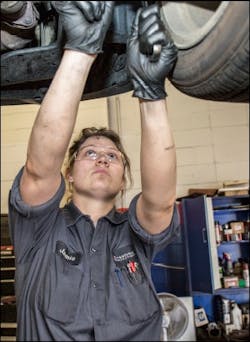Of the 1,200 technicians in the last 30 years that have been named National Institute of Automotive Service Excellence (ASE) Master Automobile Technician of the Year, only two have been women.
One of those women is Jamie Bullis, a technician at Firestone Complete Auto Care in Minnetonka, Minn.
With nine years of experience under her tool belt, Bullis, who is certified as an ASE Master Technician, has a wealth of knowledge to share with newcomers to the industry. In addition to being a top-notch technician, Bullis was rewarded for her contributions to both the industry and her community—she trains new technicians that have been hired by Firestone in the state of Minnesota, and she volunteers regularly in the Minnetonka area.
But being honored as the best in the country hasn’t slowed her personal growth. She’s taking every possible opportunity to educate herself as well.
Firestone Complete Auto Care
Location: Minnetonka, Minn.
Size: 7,000 square feet
Staff: 11 (7 technicians, 1 service manager, 1 tire manager, 1 customer service associate, 1 general manager)
“Every single day is different,” she says. “But the goal each day is to either teach somebody something new, or learn something new myself.”
Bullis shares how she’s able to balance her own daily workload while educating fellow technicians and giving back to the community.
I didn't work on cars growing up. I actually didn’t know a thing about cars until I went to college at Dakota County Technical College (in Rosemount, Minn.). I've always been a work-with-my-hands type of person, so I knew I’d find something that suited me. So the summer before my senior year in high school, I was interested in either going into mechanics or construction.
My dad works in construction, and he convinced me to not go into that business. And at another point during that summer, my uncle was putting a transmission into one of my dad’s cars, so I went up and helped him do it and I thought it was fun. So, here I am. And now I’m trying to help out other newcomers who maybe aren’t sure of themselves quite yet.
For a couple years now, I’ve trained new Firestone technicians from our zone on basics, like oil changes, flat repairs, safely lifting a vehicle on a hoist. I try to make sure that everybody coming in gets a consistent message regarding the procedures and how we do it. I'm also on the ASE Board of Governors. Outside of work, I try to volunteer when I can. I do some stuff with our church, like Loaves and Fishes, which is when we serve food to the needy once a month. I just try to get into any volunteer opportunity that I can.
On a typical day, I’m in around 7 a.m. and get the shop ready, start pulling cars in or out. Then I work on whatever comes in and assist whoever needs it. I work with a great group of people. We’re all really good at helping each other, so if I need help with something I haven't seen before or somebody else hasn't seen before, we share information and learn from each other. The automotive world is continually changing. We just bounce ideas off each other if need be and do our thing.
The front desk staff does all the scheduling of what vehicles we’ll be working on, so it’s kind of up to me in how to handle the training. I’ll work with the new technicians and find out what they’re most comfortable doing. Sometimes they’ll jump right in, and some people just end up shadowing me. I’ll work with them for a week on basic work.
I’ll go over our basic courtesy checks, which is checking belts, fluids, tires, etc. Doing it over and over during training goes a long way, and I just try to gauge how they learn best. Usually the best way is to let them have a go, and I’m just there to answer any questions.
That in-shop experience is crucial. It’s about more than working on cars. It’s about working with others, interacting with customers once in a while. Basically, what’ll happen is a customer will come in and they'll walk to the front counter and they'll deal with the sales team. Then that sales teammate will write up a ticket and they'll bring it to the back to me and then I inspect the car.
I try to show new technicians the process is about more than just going through the motions—you have to be looking for things. Let’s say I notice that a car’s transmission fluid is dirty and they have some bald tires and loose suspension parts. It helps when the trainees can watch this process and see what they should be looking for in each and every car that comes through. We’ll write up those recommendations on the ticket.
Then we'll hand the ticket back up to the sales consultant. I’ll go over the recommendations with our sales team and if they sell some of that stuff, then that’s what I’m working on.
While the sales consultants are estimating any recommendations we’ve offered, the technicians perform whatever service the customer came in for, and the estimators will come back and review the recommendation to make sure we're both on the same page.
This is good for new technicians, too, seeing these interactions. Communication is a small, but huge part of my job. I have to be on the same page with the sales team as they go back and forth with the customer, which means relaying updates I have through further inspection and keeping track of what work the customer wants done on their vehicle.
Sometimes the customer will want to come back and look at the car, or they'll have questions for the technician. If the customer decides to purchase anything additional, the sales teammate will bring the ticket back out to us and we'll fix it up, hand the ticket back to the sales team and they'll close it out with the customer.
I’d like to think I serve as a mentor. Most of the people that come in have never worked on cars in a real shop before, or they’ve just graduated. So obviously you can't just say, “Hey, there's a car that needs an engine; go for it.”
The key piece of advice I always give is to ask questions. If you have a question, ask before something bad happens. I'd rather stop what I'm doing, come over and verify something than to have somebody get hurt or to have a vehicle get damaged. So we make that imperative. If you don't know something, just ask somebody. If we don't know, we'll collectively find out what the answer is. It’s actually good for them to see that I don’t always have the right answer.
The one thing I always tried to do when I first started here is if I didn't have anything to do, I was always watching somebody else. Even now, if somebody is doing something I've never done before, I'm over there watching them. If I'm not doing anything, I'm not just sitting there. I want to be watching somebody, helping them do it, so then I’m not lost next time the situation comes back up.
If you really want to get into this business, you have to help others as much as you can, even if you're just standing there handing them tools, or holding a light for them so they can see. You’re watching them do it and you're starting to understand that process.

